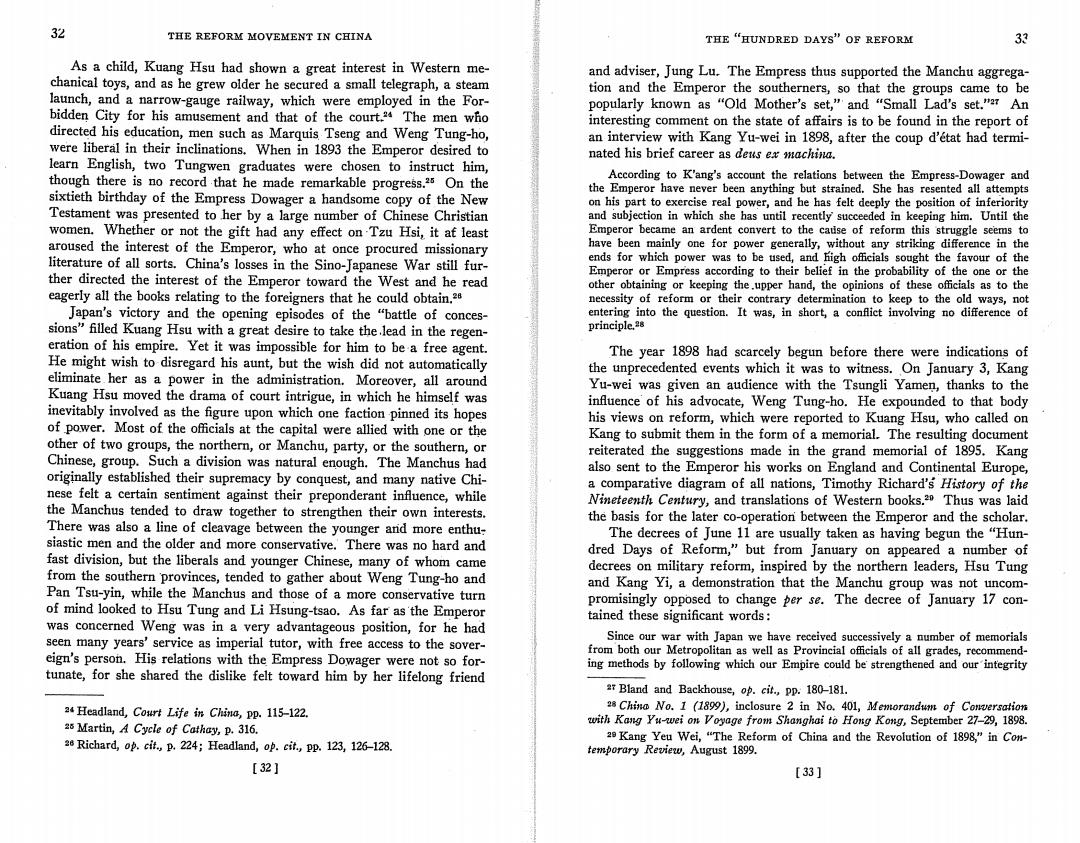正在加载图片...

32 THE REFORM MOVEMENT IN CHINA THE“HUNDRED DAYS”OF REFORM 33 As a child,Kuang Hsu had shown a great interest in Western me- and adviser,Jung Lu.The Empress thus supported the Manchu aggrega- chanical toys,and as he grew older he secured a small telegraph,a steam tion and the Emperor the southerners,so that the groups came to be launch,and a narrow-gauge railway,which were employed in the For- popularly known as "Old Mother's set,"and "Small Lad's set."ar An bidden City for his amusement and that of the court.34 The men who interesting comment on the state of affairs is to be found in the report of directed his education,men such as Marquis Tseng and Weng Tung-ho, an interview with Kang Yu-wei in 1898,after the coup d'etat had termi- were liberal in their inclinations.When in 1893 the Emperor desired to nated his brief career as deus ex machina. learn English,two Tungwen graduates were chosen to instruct him, though there is no record that he made remarkable progress.25 On the According to K'ang's account the relations between the Empress-Dowager and sixtieth birthday of the Empress Dowager a handsome copy of the New the Emperor have never been anything but strained.She has resented all attempts on his part to exercise real power,and he has felt deeply the position of inferiority Testament was presented to her by a large number of Chinese Christian and subjection in which she has until recently succeeded in keeping him.Until the women.Whether or not the gift had any effect on Tzu Hsi,it at least Emperor became an ardent convert to the cause of reform this struggle seems to aroused the interest of the Emperor,who at once procured missionary have been mainly one for power generally,without any striking difference in the literature of all sorts.China's losses in the Sino-Japanese War still fur- ends for which power was to be used,and high officials sought the favour of the ther directed the interest of the Emperor toward the West and he read Emperor or Empress according to their belief in the probability of the one or the other obtaining or keeping the.upper hand,the opinions of these officials as to the eagerly all the books relating to the foreigners that he could obtain.2 necessity of reform or their contrary determination to keep to the old ways,not Japan's victory and the opening episodes of the "battle of conces- entering into the question.It was,in short,a conflict involving no difference of sions"filled Kuang Hsu with a great desire to take the.lead in the regen- principle,28 eration of his empire.Yet it was impossible for him to be a free agent. The year 1898 had scarcely begun before there were indications of He might wish to disregard his aunt,but the wish did not automatically the unprecedented events which it was to witness.On January 3,Kang eliminate her as a power in the administration.Moreover,all around Kuang Hsu moved the drama of court intrigue,in which he himself was Yu-wei was given an audience with the Tsungli Yamen,thanks to the inevitably involved as the figure upon which one faction pinned its hopes influence of his advocate,Weng Tung-ho.He expounded to that body of power.Most of the officials at the capital were allied with one or the his views on reform,which were reported to Kuang Hsu,who called on Kang to submit them in the form of a memorial.The resulting document other of two groups,the northern,or Manchu,party,or the southern,or reiterated the suggestions made in the grand memorial of 1895.Kang Chinese,group.Such a division was natural enough.The Manchus had also sent to the Emperor his works on England and Continental Europe, originally established their supremacy by conquest,and many native Chi- a comparative diagram of all nations,Timothy Richard's History of the nese felt a certain sentiment against their preponderant infuence,while Nineteenth Century,and translations of Western books.20 Thus was laid the Manchus tended to draw together to strengthen their own interests. There was also a line of cleavage between the younger and more enthu- the basis for the later co-operation between the Emperor and the scholar. The decrees of June 11 are usually taken as having begun the "Hun- siastic men and the older and more conservative.There was no hard and fast division,but the liberals and younger Chinese,many of whom came dred Days of Reform,"but from January on appeared a number of decrees on military reform,inspired by the northern leaders,Hsu Tung from the southern provinces,tended to gather about Weng Tung-ho and Pan Tsu-yin,while the Manchus and those of a more conservative turn and Kang Yi,a demonstration that the Manchu group was not uncom- of mind looked to Hsu Tung and Li Hsung-tsao.As far as the Emperor promisingly opposed to change per se.The decree of January 17 con- tained these significant words: was concerned Weng was in a very advantageous position,for he had seen many years'service as imperial tutor,with free access to the sover- Since our war with Japan we have received successively a number of memorials eign's person.His relations with the Empress Dowager were not so for- from both our Metropolitan as well as Provincial officials of all grades,recommend- ing methods by following which our Empire could be strengthened and our integrity tunate,for she shared the dislike felt toward him by her lifelong friend ar Bland and Backhouse,op.cit.,pp.180-181. 24 Headland,Court Life in Ching,pp.115-122. 28 Chino No.I (1899),inclosure 2 in No.401,Memorandum of Conversation 26 Martin,A Cycle of Cathay,p.316. with Kang Yu-wei on Voyage from Shanghai to Hong Kong,September 27-29,1898. 2 Richard,op.cit.,p.224;Headland,op.cit.,pp.123,126-128. 2 Kang Yeu Wei,"The Reform of China and the Revolution of 1898,"in Con- femporary Review,August 1899. [32 [33]